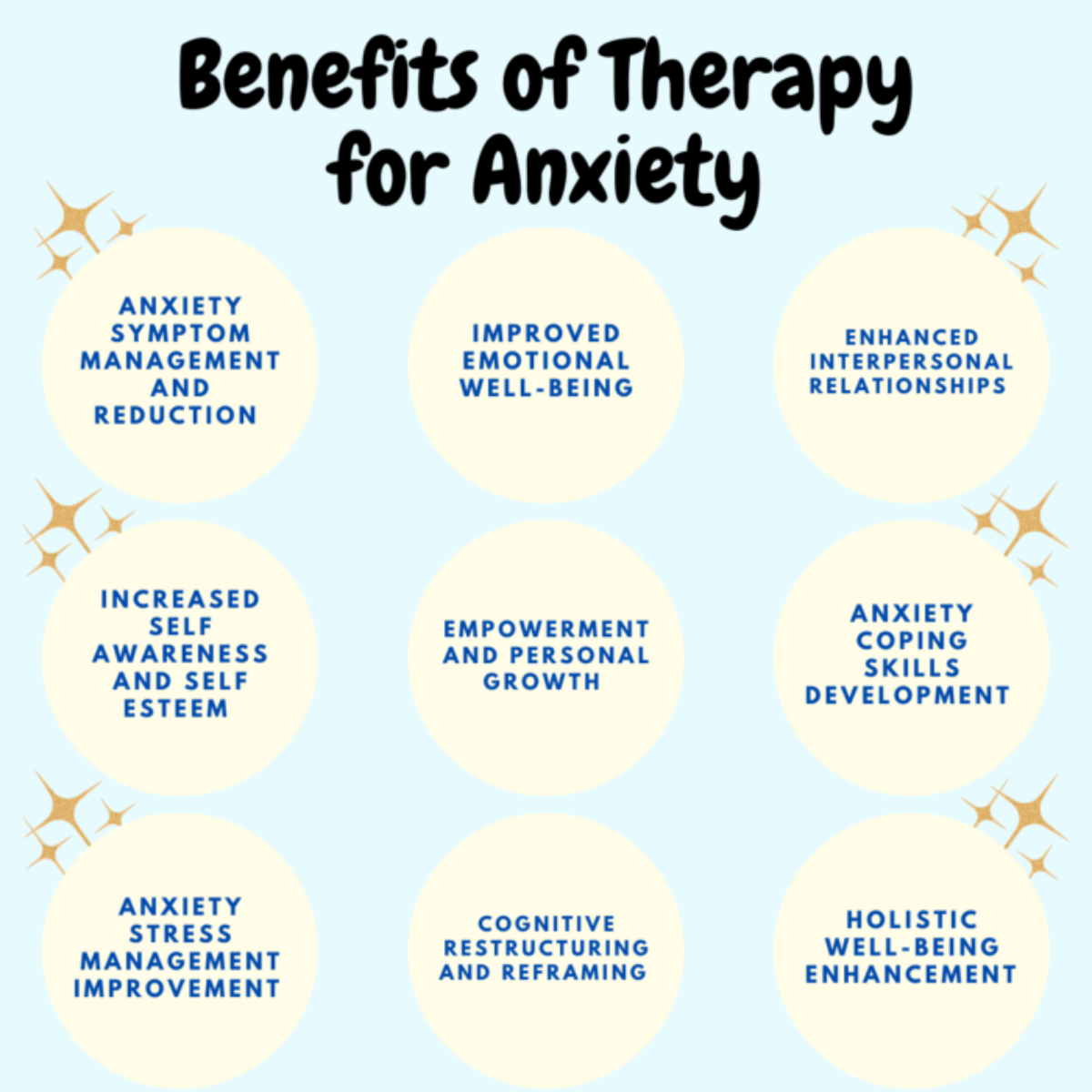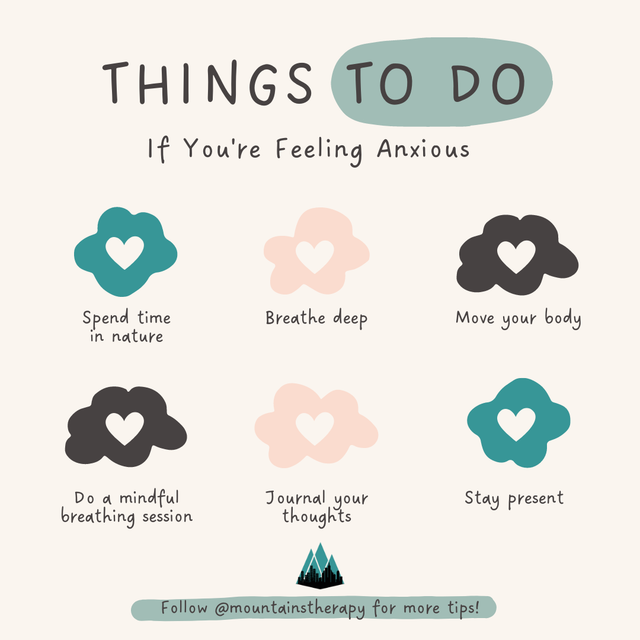Evidence-based counselling for anxiety with compassionate guidance
Evidence-based counselling for anxiety with compassionate guidance
Blog Article
Discovering Different Techniques in Counselling for Stress And Anxiety Problem for Long Lasting Modification
When taking on anxiety conditions, it's necessary to check out a selection of therapy approaches. Each technique uses one-of-a-kind insights and tools to assist you handle your signs and symptoms effectively. You might discover that integrating strategies can generate the ideal results. Comprehending the subtleties of these methods is essential to fostering long-term modification. What happens if the right mix could launch a brand-new level of emotional well-being for you?
Comprehending Stress And Anxiety Problems: A Quick Review
Stress and anxiety conditions, which influence numerous people worldwide, can substantially influence day-to-day live. You could experience frustrating sensations of concern or fret that seem uncontrollable. These feelings can lead to physical signs and symptoms like an auto racing heart, sweating, and even lightheadedness. Typical types of anxiety disorders consist of generalised stress and anxiety disorder, panic attack, and social anxiousness condition. Each has distinct signs, yet they all share a propensity to disrupt your routine and relationships.Understanding the origin triggers of your anxiety is essential. It could originate from genetics, mind chemistry, or life experiences. Identifying your triggers can assist you manage your feedbacks better. It is necessary to keep in mind that you're not alone in this struggle. Many individuals encounter similar challenges, and looking for help is a solid step towards feeling much better. By discovering anxiety problems, you're already on the course to understanding and managing your condition extra effectively.
Cognitive-Behavioral Treatment: Challenging Negative Idea Patterns
In Cognitive-Behavioral Therapy, you'll start by identifying the negative idea activates that add to your anxiety. Counseling services for anxiety. When you recognize these ideas, you'll deal with changing them with even more positive choices. With each other, you'll develop effective coping approaches to assist manage your stress and anxiety in day-to-day situations

Recognizing Adverse Idea Triggers
When you come across moments of distress, recognizing the specific triggers behind your adverse ideas can be necessary in handling anxiety. Begin by focusing on situations that prompt feelings of fear or worry. Is it a crowded area, an approaching deadline, or a discussion with certain individuals? Jot down these circumstances in a journal. This will certainly assist you determine patterns in your thinking. Notification physical feelings that accompany your adverse thoughts, like an auto racing heart or tightness in your breast. By determining these triggers, you acquire understanding into what's sustaining your anxiety. Comprehending these links is the initial step in challenging those thoughts and inevitably restoring control over your psychological responses.
Replacing Ideas With Positives
Testing unfavorable thought patterns is a necessary step in changing your frame of mind and lowering anxiety. You may typically locate on your own caught in cycles of insecurity or catastrophic reasoning. As opposed to letting these ideas dictate your sensations, technique replacing them with positive affirmations or sensible choices. When you assume, "I can not handle this," shift it to, "I can manage challenges one step at a time." This easy modification can substantially impact your mood. Frequently determining and countering these unfavorable thoughts helps create a much healthier inner discussion. Bear in mind, it requires time and initiative, however continually exercising this strategy can cause enduring adjustment, equipping you to deal with stress and anxiety with renewed confidence and resilience.
Structure Coping Methods Together

Mindfulness and Acceptance-Based Approaches: Growing Present-Moment Recognition
As you browse the intricacies of anxiousness, integrating mindfulness and acceptance-based approaches can considerably enhance your ability to grow present-moment recognition. By concentrating on the below and currently, you'll find that you can observe your ideas and feelings without judgment. This practice assists you acknowledge your anxiousness without feeling bewildered by it.Engaging in mindfulness exercises, such as deep breathing, body scans, or guided reflections, enables you to ground on your own in your present experience. Acceptance-based techniques encourage you to accept your feelings rather than fight versus them. They lose their power over you.Incorporating these techniques into your everyday regimen can change exactly how you respond to anxiousness when you accept your sensations. You'll establish durability and learn to browse stressful scenarios with higher ease. Inevitably, cultivating present-moment awareness lays the structure for long lasting adjustment, equipping you to lead a more satisfying life.
Exposure Therapy: Confronting Concerns Gradually
Direct exposure therapy aids you confront your anxieties in a gradual means, making it less frustrating. You'll learn methods to face anxiety-provoking circumstances step by step, while additionally constructing coping methods to manage your responses (Counseling services for anxiety). This approach equips you to take control and reduce stress this link and anxiety with time
Gradual Direct Exposure Strategies
When facing stress and anxiety, progressively confronting your concerns can be an effective way to gain back control. This strategy, known as progressive direct exposure, involves gradually exposing yourself to the scenarios or items that trigger your anxiousness. Start with much less daunting scenarios and slowly function your means up to more difficult ones. For circumstances, if you're worried of public speaking, you might begin by talking before a mirror, then proceed to sharing ideas with a good friend, and ultimately attend to a tiny team. Each step helps desensitize you to the fear, building your confidence over time. Remember, it's necessary to rate on your own and commemorate little success as you move through this process, enhancing your capacity to take care of anxiousness successfully.
Structure Coping Techniques
Building effective coping strategies is essential for taking care of anxiousness, particularly as you confront your fears gradually. One effective method is direct exposure treatment, where you begin by encountering your concerns in a regulated way. Start with much less daunting scenarios and gradually work your way as much as more tough situations. This progressive exposure aids desensitize you to stress and anxiety activates, making them less overwhelming.Incorporate relaxation methods, such as deep breathing or mindfulness, to calm your mind during exposure. Track your progression, celebrating little success along the means to improve your confidence. Bear in mind, it's fine to take your time; the goal isn't excellence but consistent renovation. By building these techniques, you'll encourage yourself to browse stress and anxiety and accept life much more totally.
Psychodynamic Therapy: Discovering Origin Reasons of Anxiety
Psychodynamic therapy explores the subconscious mind, disclosing the origin of your stress and anxiety. By analyzing your thoughts, feelings, and previous experiences, this method aids you reveal underlying disputes and unresolved issues that might add to your present stress and anxiety. You'll deal with a therapist to examine childhood years experiences, connections, and emotional patterns that form your reactions today.As you acquire insight right into these much deeper layers of your psyche, you'll begin to acknowledge exactly how previous occasions affect your existing habits. This understanding can bring about catharsis, enabling you to refine emotions you might have suppressed.Through the restorative connection, you can also determine protection systems that may have established with time, using a clearer course to transform. Ultimately, psychodynamic therapy outfits you with the devices to address your anxiety at its core, promoting lasting improvement in your emotional well-being.
Integrative and Holistic Techniques: Incorporating Strategies for Greater Effectiveness
Integrating numerous restorative methods can improve your trip towards managing stress and anxiety better (Counseling services for anxiety). By incorporating elements from cognitive-behavioral therapy, mindfulness techniques, and holistic techniques, you can produce a personalized approach that resolves your distinct needs. For example, you could utilize cognitive-behavioral techniques to test unfavorable thought patterns while including mindfulness exercises to ground yourself in today moment.Additionally, exploring alternative methods such as yoga or reflection can promote leisure and minimize anxiousness signs and symptoms. This blend allows you to create greater self-awareness and resilience.Experimenting with these varied approaches can aid you uncover what resonates most with you. Bear in mind, it's about finding a synergy that works, as opposed to adhering to a single method. This integrative strategy not just offers instant relief however also promotes long-lasting skills for taking care of stress and anxiety, encouraging you to redeem control over your life

The Role of Assistance Systems: Building Resilience Through Connection
While it might seem that managing stress and anxiety is a solitary trip, having a strong support system can play a crucial role in your resilience. Surrounding yourself with compassionate close friends, family members, or support teams develops a safe room where you can openly share your experiences and sensations. When you link with others, you remind yourself that you're not the only one in this struggle.These relationships supply motivation and can provide sensible coping techniques that have benefited others. It's additionally a chance to obtain perspective; good friends visit this site right here can aid you see circumstances in a different way, decreasing sensations of isolation.Moreover, emotional assistance cultivates a feeling of belonging, which can substantially relieve stress and anxiety signs. By leaning on your support system, you can develop resilience and tackle difficulties better. Keep in mind, reaching out for aid suggests toughness, and it can make all the distinction in your journey toward managing anxiety.
Frequently Asked Inquiries

What Are the Usual Signs And Symptoms of Anxiety Conditions?
You may experience uneasyness, exhaustion, problem concentrating, irritability, muscle tension, and sleep disruptions. Physical symptoms can consist of fast heartbeat, sweating, and shivering. Acknowledging these indicators early can help you seek suitable support and therapy.
The Length Of Time Does Therapy Typically Last for Anxiety Conditions?
Therapy for anxiousness disorders typically lasts anywhere from a couple of weeks to numerous months. It actually depends on your individual demands, progress, and the techniques your specialist makes use of to help you manage your stress and anxiety successfully.
Can Medicine Be Utilized Alongside Therapy for Anxiousness?
Yes, medicine can most definitely be utilized alongside therapy for stress and anxiety. Incorporating both approaches usually enhances therapy efficiency, aiding you handle symptoms while checking out underlying problems via therapy. Constantly consult your medical care service provider for tailored advice.
Are There Self-Help Strategies for Managing Anxiety?
Yes, there are numerous self-help techniques for taking care of anxiousness. You can practice mindfulness, participate in normal workout, preserve a balanced diet, develop a regular, and utilize deep breathing strategies to help in reducing anxiety signs and symptoms properly.
Just how Do I Know if I Need Professional Aid for Stress And Anxiety?
You should think about looking for expert assistance for anxiousness if it disrupts life, causes significant distress, or if self-help methods aren't working. Trust fund your instincts; connecting can result in far better coping abilities and support. Typical types of anxiousness disorders consist of generalized anxiousness disorder, panic problem, read the full info here and social anxiety problem. When you experience minutes of distress, recognizing the details triggers behind your negative ideas can be important in taking care of anxiety. Changing adverse thoughts is just the start of managing stress and anxiety effectively. By examining your ideas, sensations, and past experiences, this strategy helps you discover underlying problems and unresolved problems that might add to your present anxiety. It's likewise an opportunity to gain point of view; friends can assist you see scenarios in different ways, reducing feelings of isolation.Moreover, emotional assistance cultivates a feeling of belonging, which can greatly minimize anxiousness signs and symptoms.
Report this page